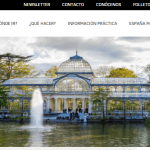Virtual Reality is helping to sustain tourists’ interest in destinations during COVID-19, several experts agreed during the “Virtual Reality in tourism promotion” webinar organised by the Smart Destinations Network.
Virtual Reality is a technological tool that allows tourists to become fully immersed in a real or fake environment, which has been created artificially, just by wearing special glasses. This tool also allows tourists to be the protagonist in this reality.
“Virtual Reality is breaking barriers in time and space, which in the current situation is extremely useful to promote destinations and tourism resources,” stated Miguel Ángel Martínez, director of Marketing at Yerba Buena VR.
Conscious of the opportunities offered by Virtual Reality in tourism marketing, destinations like Madrid and Granada have invested in this technology to help capture the interest of potential tourists. It is extremely useful in faraway markets, above all in Asia, where people are more familiar with these new technologies.
The director of the Granada Tourist Board, Francisco Maldonado, explained during the webinar that they are working towards the tourist offices in the province of Granada having more Virtual Reality content to improve customer service and visitors’ experiences, and increase their desire to visit other tourism resources in the province.
Maldonado explained that they are going to create immersive experiences of the Río Verde and virtual journeys along the beaches in Granada, the Alhambra, the Sierra Nevada, the Alpujarras and the Geoparque, as well as of some popular celebrations like the Holy Week processions, pilgrimages and the Moors and Christians festival.
The director of Graphic and Audiovisual Identity at Madrid Destino, Luis Medina, highlighted that Madrid has been working with this technology for some time as it has been proven to be attractive to tourists, who want to visit the destinations after seeing the content. Medina added that “Virtual Reality promotes loyalty in those who want to come, as when they visit the destinations, they see that what they saw is real.”
To César Urbina, creative director of Iralta VR, “The key to Virtual Reality in tourism marketing is in creating content that provides immersive experiences within a story, so you need to create an environment that invites potential tourists to interact.”
During the webinar, lots of speakers agreed on the opportunities to take tourism experiences to the digital world and to generate income from Virtual Reality of tourism resources; income that can contribute towards maintaining cultural heritage.





